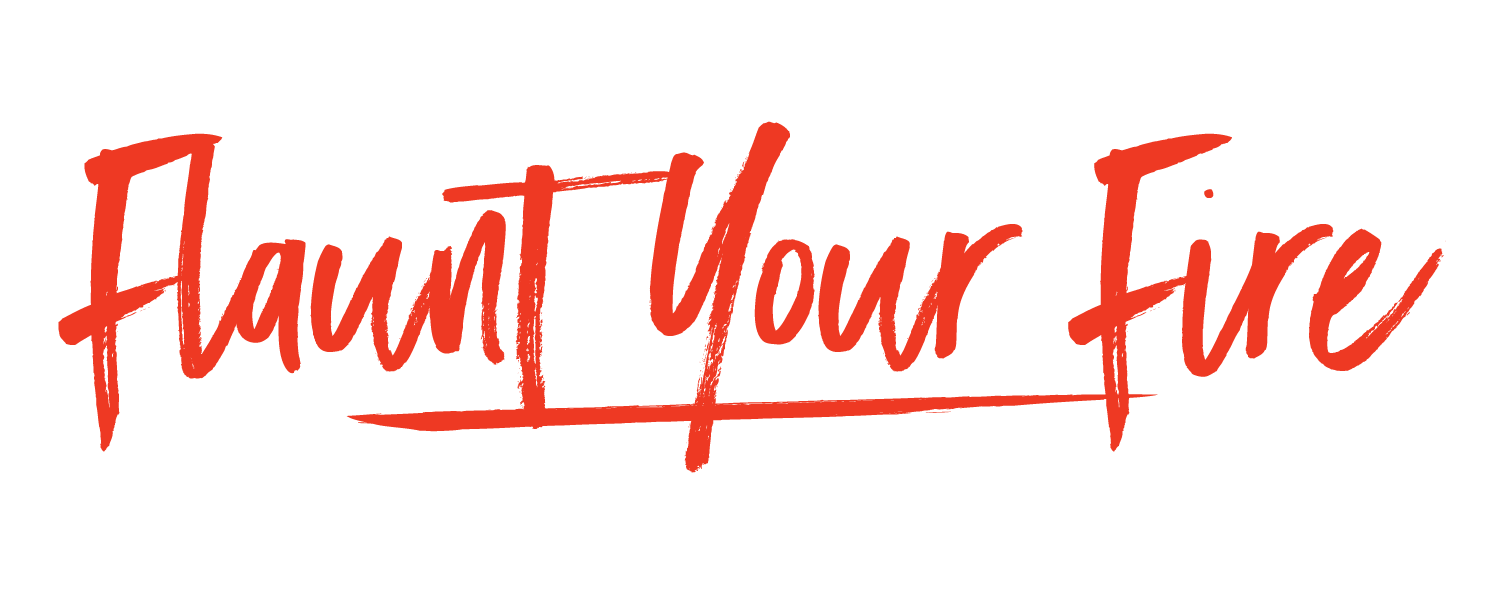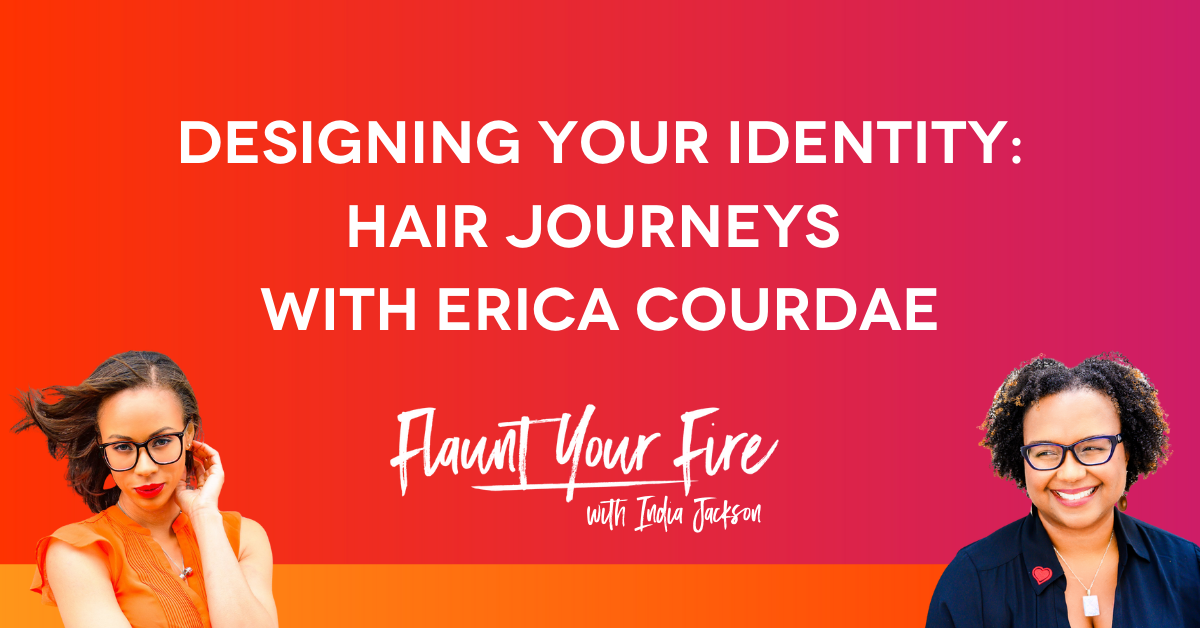55. Designing Your Identity: Hair Journeys with Erica Courdae
So tell me a little bit about yourself.
Whether it’s your social media bio, on your website, or meeting someone at a networking event, we’re constantly being asked these questions of who are you, what do you do, what do you believe in, what do you value, what do you support, where are you going?
It all comes down to, who are you?
But who you are isn’t fixed. It doesn’t have to be who you were yesterday or what someone else told you you must be. You can change, shift and grow.
You can take identity or who you are from a passive thing to an intentional act, a decision, a choice on who you want to be going forward from today. And that you can choose to change again tomorrow, if you want.
Erica Courdae joins India to explore designing your identity as an intentional act and how your personal image and identity intersect with your public image.
In this article:
Making intentional choices to design your identity
The mindset shifts and emotional challenges of going natural
How having your appearance altered as a child can complicate crafting self-perception
Examining and confronting your relationship to beauty standards
This article is based on a Flaunt Your Fire episode called Designing Your Identity: Hair Journeys with Erica Courdae
Meet Erica
Erica Courdae is a trusted advisor to entrepreneurs and executive teams committed to shifting focus, power, and resources in order to create more equity in their business and the world. She believes imperfect action is necessary to create meaningful social change and helps public figures engage in the work without fear of judgment.
In 2018, Erica co-founded the Pause on the Play® Podcast. After receiving requests from listeners for a space to connect on the show’s topics, Erica expanded the Pause on the Play brand to include a community and consultancy. Pause on the Play® has now helped hundreds of individuals define their values, diversify their networks, and call people into conversations about inclusivity and individuality.
A certified coach and 20+ year beauty industry veteran, Erica has provided training for established businesses such as Blue Cross Blue Shield, Martha Beck Incorporated, and Paul Mitchell School. Her voice has been featured on podcasts, workshops, and online communities with a combined reach of over ten thousand people.
Learn more about Erica’s work by visiting www.pauseontheplay.com
Designing Your Identity
Your personal image and your identity are part of how you show up in the world. And as Erica notes, after spending over 20 years in the beauty industry, “your hair is such a pivotal piece of your identity, how you perceive yourself, how you interact with others.”
But your image or your identity does not have to be fixed at what you were born with or what other people decide it is now.
Erica emphasizes that “you have the choice of allowing your identity to be passively crafted by others for you, or you can intentionally and purposefully craft it for yourself and you can change it.”
India adds, “I think that when we can think about that, it then opens up so many possibilities of saying if you started over today, what would you design that as? Would you even wear your hair the way that you've always worn it?” Or would you see that you were doing what you thought you needed to do or should do?
Going Natural
When it comes to terms and themes, it’s easy for people to make assumptions about what those terms mean and what, in turn, that means about or for them.
Erica uses “going natural” as an example of a phrase that has specific visual associations and connotations about who and how that person is.
She says, “I think we have to play an active part in taking these words and deciding what they mean for us, actively at that particular moment, and now feeling like...this is what this means, so it then means this about me.”
India asks Erica, “what does going natural even mean [to you]?”
Erica explains that for her, choosing to no longer chemically alter the texture of her hair was born of necessity when her hair was breaking off.
She says working with her natural curl pattern led her through a series of questions, “What do I like? What feels good to me? What do I like when I look in the mirror, what do I feel like fits my personality or the outfit I'm wearing, the vibe at that moment?”
Going natural wasn’t just a question of managing the transition of textures as Erica’s hair grew out, it necessitated a mindset shift.
India adds that when she went natural in her early twenties, it was the first time she’d seen her hair’s natural texture.
“I carried this weird energy somewhere between self-discovery and shame at the fact that I literally had two different lives on my head. One life of conformity and one life of like, hell yeah, this is who I am. Take it or leave it.”
Erica agrees that “as Black women, we grew up being conditioned to relax our hair because that was what you were supposed to do. That was a part of being acceptable...To then decide to no longer assimilate in that way until...literally, you're seeing two different lives on your head, it is kind of shocking.
“We have relaxed our hair into submission. And then when we let it grow out, it is literally shedding a skin.”
Resources and Education
Erica first began looking for alternatives to chemically straightening her hair when she was in cosmetology school but was disappointed by the alternatives and the assumptions people made about Black women with natural hair.
“Back then the alternative was kind of like...oh, you're going to go natural, you're going to wear a dashiki and you're going to smell like patchouli and your hair is going to be everywhere...There was a very specific idea of what that would say about you, if you did that.”
Erica was also frustrated by the lack of resources or education on how to care for and style her hair in its natural texture. “A lot of times I just ended up getting redirected right back to relaxer because I was afraid of the unknown if I'm honest about it.”
India adds that when she first transitioned her hair roughly eight years after Erica, the resources weren’t much better.
When she tried to find a stylist for natural hair in the DC and Baltimore areas, two predominantly Black areas, she struggled to find someone who could work with her natural hair.
She knew that she didn’t like wearing fake hair and that her hair and scalp didn’t tolerate braids well, “there was no place to figure out these things until honestly I met [Erica] and [she] started educating me on my own hair and how to take care of that.”
Your Hair Is How You Show Up
Your personal appearance plays a role in how you feel about yourself and how you’re perceived in the world.
While it may seem small for someone who doesn’t have those lived experiences, for women of color, India says, “whether or not you chemically treat your hair...is actually really big. It’s a revolutionary act.”
She goes on to say that the decision to stop chemically treating your hair brings up questions of identity and your self-image and how others perceive you.
In her personal experience, that has meant confronting beauty standards and “having to examine the long, straight hair that I was expected to have my whole life and how that was wrapped up in what people deemed as beautiful as a woman in America first and foremost, and then also being a lighter complected, mixed race-looking Black female.”
Complicating that examination, Erica says, is also the fact that for people who had their hair relaxed starting in childhood, “the way that we expressed ourselves and identified with ourselves through our hair at a young age, the choice was not our own.”
India adds, for parents, “when it comes down to chemically altering pieces of who they are...did you get permission from your child about those? And are you following scripts that were given to you? Have you examined your own identity and how you feel about what you're doing to yourself before you put that on your children?”
Erica says that the process of questioning those paradigms led her to be a de facto therapist for people transitioning their hair as they worried about the possible consequences of their decision.
Crafting Your Identity
From genuine enthusiasm to passive-aggressive and backhanded, Erica says she got comments across the spectrum when she went natural.
She says she still gets people who are convinced her natural texture can’t possibly be real.
“I think there's this disbelief of what natural hair does and does not look like in its inherent state. And that in itself is an unlearning that has to happen.”
India adds that she actually would have been one of the people who assumed Erica’s hair was manipulated in some way, because even though she has a similar hair texture, “I had never seen my own hair without a chemical in it before I met you.”
Erica says there is a reprogramming and relearning what’s possible with your natural texture that has to happen so that you can “craft what feels good for you...I think it's important to kind of have this place of deciding this is what I want for myself.”
India adds that everyone can stop and examine “where are you trying to fit yourself into a societal mold?...I see so many people, no matter what racial or ethnic background you come from, that are still trying to fit this mold of” super straight, long, blonde hair.
But when she has seen people shift away from that standard and embrace the hair that comes out of their heads, “ I've seen so much more confidence in who they are, as they begin to love what comes out of their own body.”
Connect with India and Erica:
Your actions for this episode:
Visit PauseOnThePlay.com/community to learn more about joining a community that provides an incubator where members can test ideas, ask for support and feedback and build trusting relationships that expand the ethical marketplace.
Let us know through the rating and reviews feature of Apple Podcasts or FlauntYourFire.com/rate what types of episodes you'd like to have more of here on the podcast.

